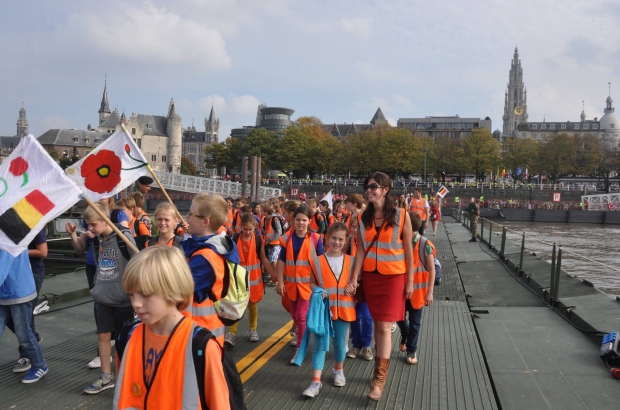- Daily & Weekly newsletters
- Buy & download The Bulletin
- Comment on our articles
Chaotic pontoon celebrations in Antwerp
The weekend’s public opening of a reconstructed pontoon bridge over the river Scheldt in central Antwerp was a major event in the city’s commemorations of the First World War, but it became chaotic, as tens of thousands of visitors who had bought tickets were turned away, including the city’s own mayor, Bart De Wever.
The problem arose, organisers said, because people were taking longer to cross the bridge than expected. In their planning, they had estimated an average of five minutes for a crossing, with people walking at about 5 km/h.
In the event, the crowds moved much more slowly, as people took time in the beautiful weather on Saturday to take in the view from the middle of the river only centimetres above the water, and to take photos. Tickets were €5 per person.
“It was apparently calculated that more people would cross the bridge at a particular speed,” De Wever said. “However, people walk more slowly because of course they want to take photos. I can perfectly well understand that everyone is angry.”
The pontoon commemorates a bridge of a similar style – individual floating sections manoeuvred into place by boats – that was built over the Scheldt in October 1914, the only bridge that has ever spanned the river within the city limits. Belgian military engineers eventually built four bridges, all of them temporary, for moving supplies during the war. They were eventually used to evacuate citizens from the city.
The pontoon had a festival opening on Friday, with the king and queen the first to cross, at about 13.45, accompanied by ministers, ambassadors and centenarian Josée Heyrman, who was five years old when the original pontoon bridge was constructed.
By the evening, there were serious delays – each ticket was booked for a particular half-hour time-slot, but visitors were having to wait for hours. A crisis meeting was held on Saturday morning, and crossings were suspended and visitors turned away. The bridge opened an hour late, and later had to be closed again to make way for shipping. An estimated 12,000 to 15,000 people paid for a crossing they were unable to make.
On Sunday, meanwhile, a number of time slots were cancelled, causing some unrest among people with tickets, but on the whole the day went ahead without problems, organisers said. People were advised to keep to a tempo of 3 km/h – the speed of window-shopping, visitors were told. Those who couldn’t cross will be reimbursed for the cost of their ticket.
Meanwhile, the schelfie – a combination of “selfie” and “Schelde” – made its first appearance on Twitter on Friday.
Photo courtesy Antwerpen 14-18



















